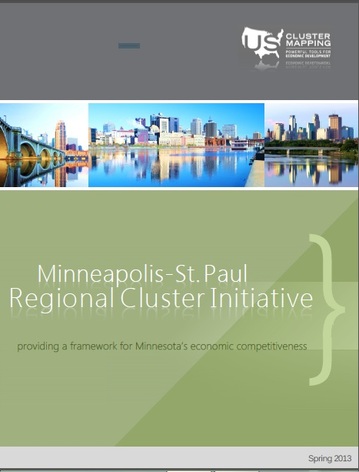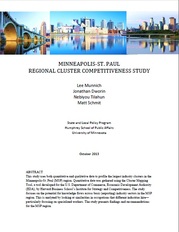- Campuses :
- Twin Cities
- Crookston
- Duluth
- Morris
- Rochester
- Other Locations

 Minneapolis-St. Paul Regional Cluster Initiative: Providing a Framework for Minnesota's Economic Competitiveness
Minneapolis-St. Paul Regional Cluster Initiative: Providing a Framework for Minnesota's Economic Competitiveness
This Policy and Impact Study by the Humphrey School of Public Affairs, State and Local Policy Program at the University of Minnesota is the second in a series of four developed as part of the U.S. Cluster Mapping Project, an effort supported by the U.S. Economic Development Administration. The report illustrates how Minneapolis-St. Paul (MSP) has benefited from applying a cluster approach as a conceptual framework for diagnosing the regional economy and as a platform for joint action to address the challenges identified. The cluster framework provided public and private regional leaders with a common language for understanding regional competitiveness, significantly enhancing the effectiveness of their dialogue. By organizing the policy discussion around clusters, the programs that were developed became targeted enough to have an effect on the issues that mattered for MSP. The cluster-based approach was first applied in workforce development, but over time has been used in other policy areas as well, including in the creation of a broader regional economic development strategy.

Minneapolis-St. Paul Regional Cluster Competitiveness Study
This study by the State and Local Policy Program at UMN's Humphrey School of Public Affairs uses quantitative and qualitative data to profile the 12 largest industry clusters in the Minneapolis-St. Paul (MSP) region, as well as emerging clusters of interest. Quantitative data was gathered using the U.S. Cluster Mapping website tools. Presenting economic findings and recommendations for the MSP region, the study can also serve as a companion piece to the U.S. Cluster Mapping Minneapolis-St. Paul Policy and Impact Study.